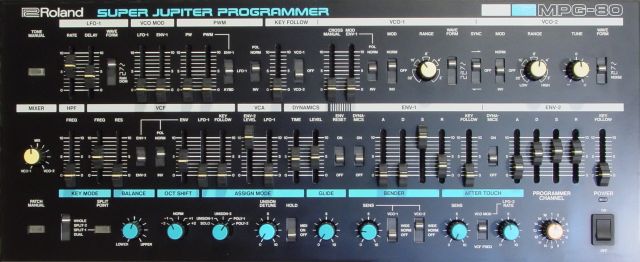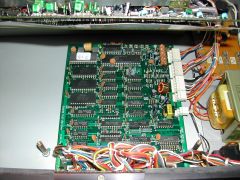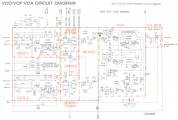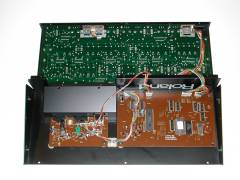![]()
![]()
![]()


Thank goodness I didn't buy that Jupiter-6! My synthesizer roots go back to the Yamaha CS-5, CS-20M and Roland Juno-60 (none of which I still own, but wish I did), so the Roland MKS-80 and MPG-80 combination is a compelling setup given the capacity for massive manual control. The MKS-80 shares many sonic characteristics and it's basic voice architecture with the Roland Jupiter-6, but adds modern conveniences such as velocity and after-touch sensitivity as well as a number of other features. A sizeable investment to make on eBay, but you only live once!
The unit depicted started life as a Version 3 and has been well used since it's manufacture in 1984. It's no museum piece, but is in great mechanical condition. After purchasing the unit from a studio in Los Angeles, I had the seller drop it off at MusicTek Services in North Hollywood to be serviced by noted analog tech J.L. It was fully calibrated, upgraded to Version 4 software and shipped to me Seattle.
Upon receipt of the unit, I plugged it in and played with it for a couple of hours before tearing into it to check out the insides. The MKS-80 is a frighteningly complex machine with a total of 7 PCB's including 2 voice boards, CPU, power supply, I/O board, MIDI board and front panel controls.
|
MKS-80 interior view showing one of the voice boards (green), power supply, MIDI and I/O boards (jpeg - 2272x1704) |
 The CPU board, located under the two voice boards (jpeg - 1600x1200) |
Close up of the top voice board (jpeg - 2272x1704) |
Even closer view of the voice board (jpeg - 2272x1704) |
 VCO/VCF/VCA Circuit Diagram (jpeg - 3774x2544) |
|
The MPG-80 controller had an issue with some noisy pots, which J.L. dealt with, but the root cause was still an issue. After 18 years, the foam rubber pads originally designed to protect the horizontal taper pots from dust and debris had deteriorated from exposure to ozone and pollution. Every time you used one of the sliders, the pads would flake dried rubber dust into the pots, causing them to malfunction. After careful consideration, I decided to remove the controller board and replace the foam rubber with black felt. While I was in the unit, I cleaned and lubricated the pots, improving their feel and performance. The operation took a week and had a few scary moments, but the result was worth the effort.
 MPG-80 with the screws out |
|
I feel a little sorry for my trusty Oberheim Matrix-6, which has been relegated for the most part to mundane controller duties. It still has some unique qualities, including comprehensive modulation and routing capabilities, which are actually far superior to the MKS-80's, but then again, the MKS-80 is real analog, isn't it? The Oberheim still gets used from time to time, but the lack of an effective user interface is definitely a deterrent.
Related Links:
| CEM 3340 VCO data sheet | CEM 3360 VCA data sheet |
| MKS Series Information Site | MKS-80 Patch Manager |
| Vintage Synth Explorer | SynthMuseum |
| Gordon Reid's excellent 1998 Jupiter Synth Retrospective in Sound On Sound Magazine | |
32158
This page created on: 10/20/2009 23:00:54 - updated: 3/23/2015 22:21:37.
This site has hosted 670,669 unique sessions since 10/21/2001.